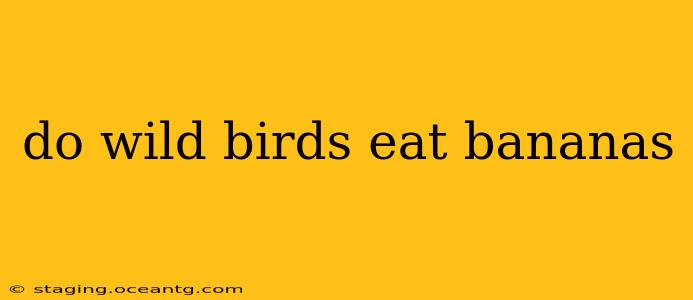Do Wild Birds Eat Bananas? A Surprising Look at Avian Diets
The simple answer is: some wild birds will eat bananas, but it's not a staple part of their diet. While the image of a bird happily munching on a banana might seem charming, it’s crucial to understand the context and potential consequences. This article delves into the specifics, addressing common questions and concerns surrounding this topic.
What types of wild birds might eat bananas?
Many birds are opportunistic feeders, meaning they'll sample a variety of foods if the opportunity presents itself. Birds with a more frugivorous (fruit-eating) diet are more likely to try a banana. This includes species like:
- Tucans: Known for their large, colorful beaks, tucans readily consume various fruits, and a banana would likely be a welcome treat.
- Parrots: Many parrot species enjoy sweet fruits, and a banana could be part of a diverse diet in captivity or occasionally in the wild.
- Robins: While primarily insectivores, robins will also eat berries and other soft fruits, potentially including a piece of banana if available.
- Other fruit-eating birds: Various other species, depending on their habitat and natural food sources, might nibble on a banana if given the chance.
It’s important to remember that this isn’t an exhaustive list. The likelihood of a particular bird species eating a banana depends greatly on its natural diet and the availability of other food sources.
Is it safe for wild birds to eat bananas?
While a small piece of banana won't likely harm a bird, it shouldn't be a regular part of their diet. Bananas are high in sugar, and excessive sugar consumption can lead to health problems in birds, similar to humans. A diet lacking in necessary nutrients and overly reliant on sugary foods can cause:
- Obesity: Leading to decreased mobility and other health issues.
- Nutritional deficiencies: Bananas, while providing some potassium, lack the balanced nutrients birds need for healthy growth and development.
- Digestive problems: The high sugar content can upset a bird's delicate digestive system.
Therefore, offering bananas as a treat should be an occasional occurrence at most, and only in small quantities.
What are the best foods for wild birds?
Instead of bananas, consider providing wild birds with food sources that naturally align with their diets. These include:
- Seeds: Sunflower seeds, niger seeds, and millet are excellent options.
- Nuts: Unsalted peanuts, pecans, and walnuts (in moderation).
- Suet: A high-energy food source, especially beneficial in winter.
- Fruit (in moderation): Berries, apples (remove seeds), and other fruits appropriate for their species.
- Water: Clean water is crucial for all birds.
It's best to consult reputable sources on bird feeding, such as local wildlife organizations or birdwatching societies, to determine the best foods for the species in your area.
Should I feed wild birds bananas?
The short answer is: generally, no. While a small piece might not harm a bird, offering bananas regularly can be detrimental to their health. Focus on providing a balanced and natural diet that meets their nutritional needs. Remember, the best way to help wild birds is to provide a safe habitat with ample natural food sources. Observe birds from a safe distance and avoid interfering with their natural behavior.
By understanding what wild birds truly need and avoiding potentially harmful foods, you can contribute to their health and well-being, ensuring they thrive in their natural environment.
